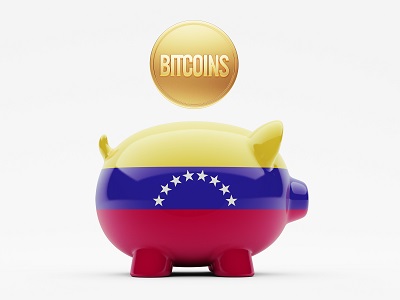If you lived in a country ravaged by crime and widespread food shortages, what lengths would you go to in order to feed your family? We’ve all heard stories of the dangers people bravely face to do just that. According to Reason’s Jim Epstein, guest on this EconTalk episode, a growing number of people in Venezuela have found a safer- thus far- method. The price controls that have kept grocery shelves empty have also created a cheap supply of electricity, and some enterprising young Venezuelans have set up shop as Bitcoin miners. While it’s harder to squeeze value out of this in more developed countries, “it’s like having a home mint” in Caracas.
While the technology underlying this process is fascinating, the really intriguing part of the story is the part Bitcoin may- or may not- be able to play in freeing up the economy.
1. The title of this Extra comes from Epstein…What does he mean when he says Bitcoin is “turning socialism against itself?” To what extent do you share his optimism?
2. In describing the secret Facebook group used to facilitate exchange with Bitcoin, Epstein reports that while the group was originally intended to share ideas about libertarian economics, the focus has changed. Participants are interested in commerce, not ideology, he says. How does this bode for the future of freedom? Put another way, is commerce or ideas more likely to further individual freedom?
3. Roberts asks Epstein why the Venezuelan (or later, Brazilian) government doesn’t crack down on Bitcoin miners. How does Epstein respond? How could the state get tighter control over Bitcoin mining and exchange, and how valuable would such control be?
4. Epstein describes Bitcoin as “a database that nobody controls but everyone can trust.” What does he mean by this, and how can such trust be maintained?
5. Toward the end of the conversation, Roberts and Epstein hint at other ways that Bitcoin might reduce transaction costs. In what other kinds of markets might Bitcoin serve this function? Have you had such an experience with Bitcoin? In what other ways might Bitcoin also be freedom-enhancing?


READER COMMENTS
Kevin Ryan
Feb 19 2017 at 12:33pm
As no one else has yet contributed to this item, I’ll offer responses on a couple of these points, while trying to avoid duplicating comments I made on the Podcast itself:-
1. My assumption is that when Epstein referred to “turning socialism against itself”, what he had in mind was that Bitcoin mining in Venezuela, as described, was an example of allowing people to take advantage of socialist policies for objectives that are contrary to the intent of those policies and therefore undermining and weakening governments pursuing socialist policies.
The most obvious element here is the use by “entrepreneurs” of free electricity – a socialist policy that is inherently wasteful – to make money from mining.
Extensive free education has been another flagship socialist policy of the Chaves regime. Presumably to some degree this has contributed to a savvy population who are aware of the potential to make money from data mining; (The examples quoted also include a doctor-turned-miner. I don’t know whether medical training is free in Venezuela but, if it is, this is another aspect of a socialist policy being undermined by Bitcoin.)
I wouldn’t have thought that Bitcoin mining in Venezuela is by any means a unique example of turning socialism against itself; and I would expect (many) more opportunities to appear over time. So I am optimistic in that sense, but without necessarily believing that all schemes that have this effect are good things.
2 Participants being interested in commerce not ideology? I assume this just meant that most of the users were interested in making money for themselves, and not pursuing freedom or any associated broad objective that would be consistent with the philosophy of Econtalk/Econlib.
Hence we are reliant on Adam Smith’s Invisible Hand for their efforts to produce good outcomes in the pursuit of freedom or anything else
Comments are closed.